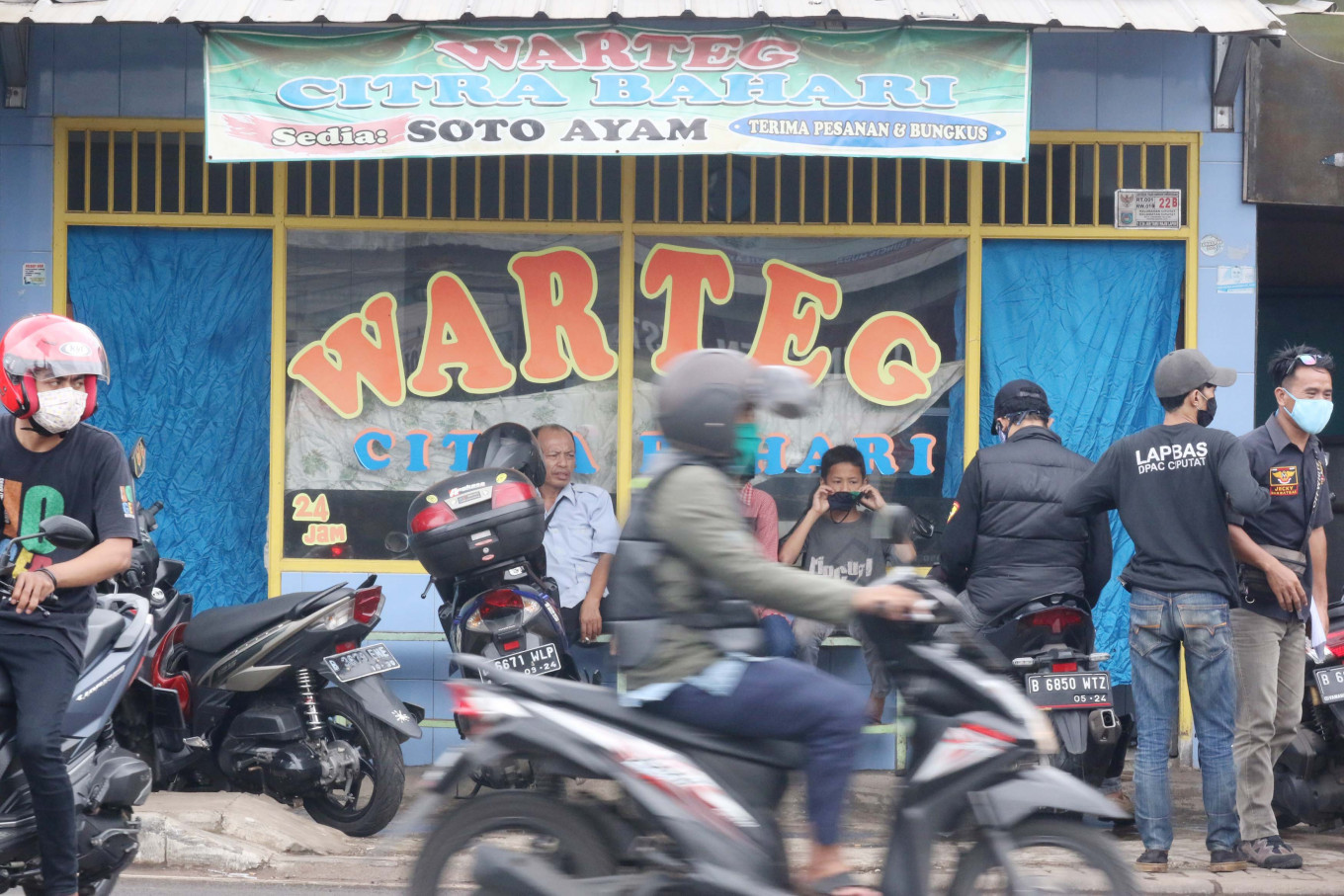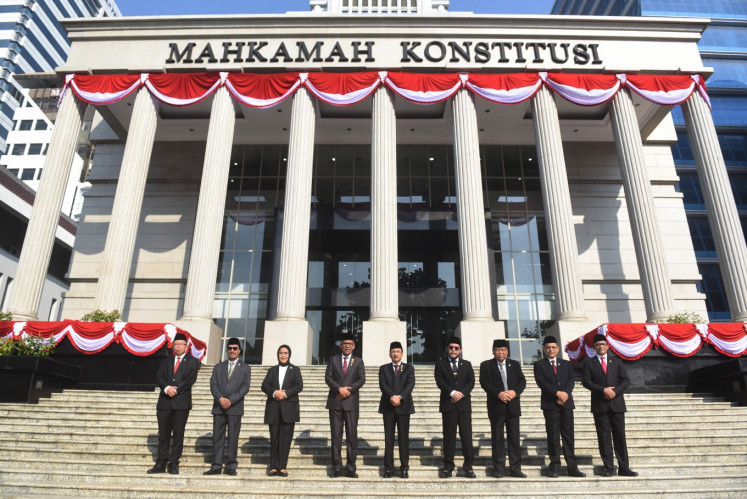Popular Reads
Top Results
Can't find what you're looking for?
View all search resultsPopular Reads
Top Results
Can't find what you're looking for?
View all search resultsFasting and maintaining immunity during the COVID-19 pandemic
Muslims worldwide might ask is it safe to fast when our immune system is at risk due to the COVID-19 pandemic?
Change text size
Gift Premium Articles
to Anyone
 Out of sight: The doors and windows of an eatery on Jl. Dewi Sartika in South Tangerang, Banten, are covered up on Monday out of respect for those fasting during Ramadan. The South Tangerang city administration extended its large-scale social restrictions for another two weeks on Saturday. (JP/Dhoni Setiawan)
Out of sight: The doors and windows of an eatery on Jl. Dewi Sartika in South Tangerang, Banten, are covered up on Monday out of respect for those fasting during Ramadan. The South Tangerang city administration extended its large-scale social restrictions for another two weeks on Saturday. (JP/Dhoni Setiawan)
R
amadan is a holy month for Muslims all over the world. During this period, Muslims abstain from eating or drinking from dawn to sunset.
However, this year Muslims face a new challenge: the COVID-19 pandemic. Fasting during a pandemic might be a new thing for some of us. The usual practices and habits that we have, such as tarawih (Ramadan night prayers) and iftar (breaking-of-the-fast) events are suddenly outlawed by the government due to physical-distancing rules. The customary tradition of going back to our hometowns, known as mudik, has also been prohibited.
Not only that, there are also some considerations for fasting during this pandemic. Most importantly, Muslims worldwide might think of the same question: Is it safe to fast when our immune system is at risk?
The clinical manifestation of COVID-19 infection is highly correlated with our immunity levels, according to Ari Baskoro, immunologist from Airlangga University in Surabaya, East Java. In short, the higher our immunity level is, the milder the clinical manifestation will be when someone gets infected with the coronavirus. Nonetheless, what if fasting has been known to lower immunity?
There have been a lot of research and studies conducted on the effect of fasting on our immunity. Results from a study show that 30-day long intermittent fasting, just like the kind of fasting done by Muslims during the month of Ramadan, is associated with better glucose and lipid metabolism, DNA repair, cognitive functions and protective properties against cancer. Fasting has been equated with “flipping a metabolic switch”–that is, fasting leads to lower blood sugar levels, and consequently forces our body to use fat as a source of energy, as explained by Kathy McManus, director of the Department of Nutrition at Brigham Hospital in Boston, Massachusetts, the United States. Research at Harvard University shows that fasting is also associated with lower blood pressure, lower cholesterol levels and less inflammation.
However, other studies show contradictory results. In three studies published in the scientific journal Cell, fasting in mice has shown differing impacts on the immune system depending on the type and length of fast. Longer fasting has shown detrimental effects on the immune system: with reduced levels of white blood cells, which are necessary to fight off infections. Fasting has also been shown to exacerbate metabolic dysfunction and cause significant immune response impairments in these studies. Fasting has many side effects as well, including dizziness, low blood sugar, weakness and fatigue. Prolonged fasting may lead to low red blood cell levels (anemia), a weakened immune system and various vitamin and mineral deficiencies.
Amid the differing results from studies on fasting and immunity, Muslims might be unsure whether or not to go through with the Ramadan fast this year. To answer this question, Muslim authorities have issued fatwas regarding Ramadan fasting during the COVID-19 pandemic. Al-Azhar University in Cairo issued a statement restating that fasting is an obligation for all Muslims, even during this pandemic. The grand mufti of Dubai’s Islamic Affairs and Charitable Activities Department, Ali Ahmad Mashael, said that fasting may only be forgone by those who are ill. Citing the Quran, he further said that the only exceptions for fasting are for those who are sick or traveling. Not only Muslim authorities, the World Health Organization has released an interim guide on Ramadan fasting during the COVID-19 pandemic, with emphasis on taking care of our health and maintaining physical distancing at all times.
Recent literature on COVID-19 has shown that certain people are at higher risk of coronavirus infection. These are people with low immunity, those who already suffer from chronic diseases such as diabetes, hypertension or cardiovascular problems. These people are exempt from fasting during Ramadan, including those who suffer from COVID-19. The British Islamic Medical Association has published a guide stating that people who suffer from COVID-19 symptoms (such as fever or persistent cough) should abstain from fasting to ensure adequate hydration.
As a medical doctor who continues to work even during this pandemic, my family is worried about my safety. Being one of the people who are fasting during Ramadan, I am worried that practicing the fast might weaken my immune system, therefore exposing me to a higher risk of coronavirus infection.
I believe I am not the only one. Many workers out there, medical or non-medical, must worry about their state of immunity during fasting. But I personally believe, from the knowledge I have as a physician, and fatwas issued by corresponding authorities, that it is safe for me to continue fasting during this pandemic.
Of course, when choosing to fast, we also need to know how to maintain our immunity during this pandemic. The WHO has recommended a few instructions on maintaining well-being during fasting, including staying physically active by exercising indoors or at home, eating fresh and unprocessed food every day, drinking plenty of water during sahur (predawn meal) and iftar, reducing tobacco use during the non-fasting period, and maintaining mental health by staying in contact with loved ones through digital platforms.
Other common practices during Ramadan should also be avoided. The Religious Affairs and Health Ministries have agreed that people should not perform tarawih prayers in mosques this year, and avoid having iftar together with friends in public places. President Joko "Jokowi" Widodo has also forbidden the practice of going back to hometowns to visit relatives during Idul Fitri.
The newly implemented laws and prohibitions have made Ramadan this year anything but normal, and may impact our mental health as well. However, we should all maintain hope and strength during these difficult times, and don’t forget to keep practicing physical distancing during fasting. (kes)
***
Maria Cellina Wijaya is a medical doctor from Airlangga University and a researcher at the COVID-19 Research Team in the clinical research unit of Dr. Soetomo Regional General Hospital, Surabaya, East Java.









